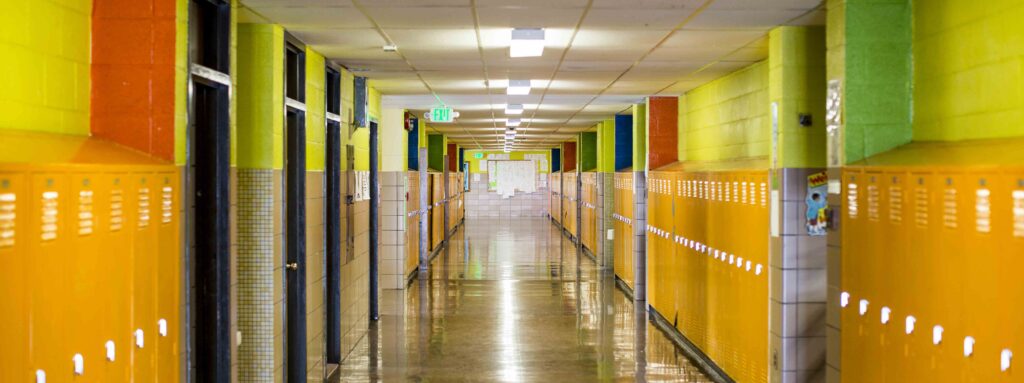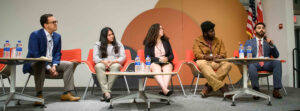My first year at Colby College, most nights I’d stay in the library studying alone until I saw the sunrise. I’d cry into my laptop because no matter how hard I tried, I just couldn’t understand the material. I’m a junior now, which means I’m still standing—but it wasn’t easy getting here. This wasn’t because I did badly in high school. In fact, I got mostly As and a few Bs. But I was let down by my K-12 experience. In part, because of the low expectations teachers had for me that still affect me today.
My high school in Queens, New York is a vocational school, where there was more of a focus on courses like pre-engineering, electrical installation, cosmetology, and stuff like that, so students were learning skills they could use immediately after school to earn good livings. That was amazing, but there was also a lack of recognition for students who want to go a more academic route after high school.
I’m Black, and I think that’s very related to the low expectations many of my teachers had for me. My parents emigrated from West Africa, and neither had a middle school education. My dad has worked in construction and carpentry since he was a kid working alongside his father in Guinea. It seemed like, in many of my teachers’ eyes, there were only two types of Black kids: exceptional students or failures. There was no in-between. So, because I sometimes got Bs, I was lumped in with the “failures”—and there weren’t many teachers that pushed me to go beyond that.
On one occasion, a physics teacher pointed kids out in class in front of everyone, guessing how we’d do on the state exams. Going row by row, he said, “Oh, you'll definitely pass. You'll pass. You'll barely pass.” I remember he pointed at me and said, “Oh, you'll fail.” That was extremely toxic and harmful. I ended up doing well on the exam and majoring in physics at Colby. I told my teacher this when I visited the following year. You’d think he’d be proud, but he seemed more surprised than anything else.
Another way I feel let down by my high school is that the work was too easy, especially compared to the work I got my first year in college. Looking back on those years, it’s clear to me there was a lot of leniency in the way we were graded, and in the difficulty of our assignments and exams. I remember writing essays in high school and thinking my teachers could’ve put more effort into crafting our skills and making us better writers, rather than just giving us good grades that didn’t reflect reality. For example, for global history exams we would essentially get the questions beforehand—all multiple choice—to study for the exam. Technically, they were past exams, but they recycled the questions each year, so you could just memorize the answers to most of the questions that would be on the test. Those easy As weren’t preparing me for college.
I expected to struggle when I got to Colby and was even excited for it—but my experience was much worse than that. No matter how much I studied, my grades kept plummeting, and there was nothing I could do about it. That’s when I knew that, though it was great that I had made it to college, I was definitely not as ready as I thought I was.
I felt isolated. I would spend a day doing homework that took some kids just a few hours. I didn’t feel comfortable working on group projects because I knew I would slow the group down. I didn’t even want to work on homework with other people because it was so much more difficult for me; they’d be on problem number four when I’d hardly finished the first one.
At the end of the school year, when I got my grades, they were so abysmal I had an anxiety attack. It was clear that my lack of preparedness was more severe than the majority of my classmates. Given how hard everything was for me, my definition of a bad grade was very different than theirs. There were times when I’d talk to them and think, “I wish I were struggling like you’re struggling.” I had to accept the fact that I came from a less privileged background than they did, and I was at a disadvantage.
Things began to get better when I joined Students Organized for Black and Latinx Unity, which is a combination of a Black Student Union and a Latinx student organization. It's basically a big family. I’d finally found people I was comfortable studying with and confiding in. Whenever I’d feel defeated, they would encourage me and tell me they knew I could do it. On top of that, I learned how to utilize the resources on campus and started to get over the fear of asking for help and imposter syndrome I’d developed in high school. My grade point average for my sophomore fall and spring went up a point and a half compared to my first year.
After I graduate, I plan on pursuing a career in engineering—I feel ready to take on the world, and will no longer underestimate the type of obstacles I may encounter. Unfortunately, that’s not because of my education before Colby. Instead, I know with all I’ve overcome to finish school, I’ll be able to confront the challenges ahead of me with more confidence. In a way, I’m grateful. At the same time, I firmly believe no kid should have to experience this—and it’s up to the adults in the education system to change things for all of us.
Read more about students' experiences in school in The Opportunity Myth—then take the first step by requesting your own free action guide featuring tools and advice to help more students in your community have worthwhile experiences in school.




